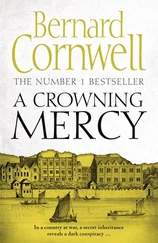'And I am certain, my Lord,' Witherspoon put in smoothly, 'that their gratitude is unbounded.'
Sidmouth ignored his secretary. Instead he tossed a scrolled and ribboned petition to Sandman. 'And once in a while,' he went on, 'once in a very rare while, a petition will persuade us to investigate the facts of the matter. On those rare occasions, Captain, we appoint an Investigator, but it is not something we like to do.' He paused, obviously inviting Sandman to enquire why the Home Office was so reluctant to appoint an Investigator, but Sandman seemed oblivious to the question as he slid the ribbon from the scroll. 'A person condemned to death,' the Home Secretary offered the explanation anyway, 'has already been tried. He or she has been judged and found guilty by a court of law, and it is not the business of His Majesty's government to revisit facts that have been considered by the proper courts. It is not our policy, Captain, to undermine the judiciary, but once in a while, very infrequently, we do investigate. That petition is just such a rare case.'
Sandman unrolled the petition, which was written in brownish ink on cheap yellow paper. 'As God is my wittness,' he read, 'hee is a good boy and could never have killd the Lady Avebury as God knows hee could not hert even a flie.' There was much more in the same manner, but Sandman could not read on because the Home Secretary had started to talk again.
'The matter,' Lord Sidmouth explained, 'concerns Charles Corday. That is not his real name. The petition, as you can see for yourself, comes from Corday's mother, who subscribes herself as Cruttwell, but the boy seems to have adopted a French name. God knows why. He stands convicted of murdering the Countess of Avebury. You doubtless recollect the case?'
'I fear not, my Lord,' Sandman said. He had never taken much interest in crime, had never bought the Newgate Calendars nor read the broadsheets that celebrated notorious felons and their savage deeds.
'There's no mystery about it,' the Home Secretary said. 'The wretched man raped and stabbed the Countess of Avebury and he thoroughly deserves to hang. He is due on the scaffold when?' He turned to Witherspoon.
'A week from today, my lord,' Witherspoon said.
'If there's no mystery, my lord,' Sandman said, 'then why investigate the facts?'
'Because the petitioner, Maisie Cruttwell,' Sidmouth spoke the name as though it tasted sour on his tongue, 'is a seamstress to Her Majesty, Queen Charlotte, and Her Majesty has graciously taken an interest.' Lord Sidmouth's voice made it plain that he could have gladly strangled King George III's wife for being so gracious. 'It is my responsibility, Captain, and my loyal duty to reassure Her Majesty that every possible enquiry has been made and that there is not the slightest doubt about the wretched man's guilt. I have therefore written to Her Majesty to inform her that I am appointing an Investigator who will examine the facts and thus offer an assurance that justice is indeed being done.' Sidmouth had explained all this in a bored voice, but now pointed a bony forefinger at Sandman. 'I am asking whether you will be that Investigator, Captain, and whether you comprehend what is needed.'
Sandman nodded. 'You wish to reassure the Queen, my Lord, and to do that you must be entirely satisfied of the prisoner's guilt.'
'No!' Sidmouth snapped, and sounded genuinely angry. 'I am already entirely satisfied of the man's guilt. Corday, or whatever he chooses to call himself, was convicted after the due process of the law. It is the Queen who needs reassurance.'
'I understand,' Sandman said.
Witherspoon leant forward. 'Forgive the question, Captain, but you're not of a radical disposition?'
'Radical?'
'You do not have objections to the gallows?'
'For a man who rapes and kills?' Sandman sounded indignant. 'Of course not.' The answer was honest enough, though in truth Sandman had not thought much about the gallows. It was not something he had ever seen, though he knew there was a scaffold at Newgate, a second south of the river at the Horsemonger Lane prison, and another in every assize town of England and Wales. Once in a while he would hear an argument that the scaffold was being used too widely or that it was a nonsense to hang a hungry villager for stealing a five-shilling lamb, but few folk wanted to do away with the noose altogether. The scaffold was a deterrent, a punishment and an example. It was a necessity. It was civilisation's machine and it protected all law-abiding citizens from their predators.
Witherspoon, satisfied with Sandman's indignant answer, smiled. 'I did not think you were a radical,' he said emolliently, 'but one must be sure.'
'So,' Lord Sidmouth glanced at the grandfather clock, 'will you undertake to be our Investigator?' He expected an immediate answer, but Sandman hesitated. That hesitation was not because he did not want the job, but because he doubted he possessed the qualifications to be an investigator of crime, but then, he wondered, who did? Lord Sidmouth mistook the hesitation for reluctance. 'The job will hardly tax you, Captain,' he said testily, 'the wretch is plainly guilty and one merely wishes to satisfy the Queen's womanly concerns. A month's pay for a day's work?' He paused and sneered. 'Or do you fear the appointment will interfere with your cricket?'
Sandman needed a month's pay and so he ignored the insults. 'Of course I shall do it, my lord,' he said, 'I shall be honoured.'
Witherspoon stood, the signal that the audience was over, and the Home Secretary nodded his farewell. 'Witherspoon will provide you with a letter of authorisation,' he said, 'and I shall look forward to receiving your report. Good day to you, sir.'
'Your servant, my lord,' Sandman bowed, but the Home Secretary was already attending to other business.
Sandman followed the secretary into an anteroom where a clerk was busy at a table. 'It will take a moment to seal your letter,' Witherspoon said, 'so, please, sit.'
Sandman had brought the Corday petition with him and now read it all the way through, though he gleaned little more information from the ill-written words. The condemned man's mother, who had signed the petition with a cross, had merely dictated an incoherent plea for mercy. Her son was a good boy, she claimed, a harmless soul and a Christian, but beneath her pleas were two damning comments. 'Preposterous,' the first read, 'he is guilty of a heinous crime,' while the second comment, in a crabbed handwriting, stated: 'Let the Law take its course.' Sandman showed the petition to Witherspoon. 'Who wrote the comments?'
'The second is the Home Secretary's decision,' Witherspoon said, 'and was written before we knew Her Majesty was involved. And the first? That's from the judge who passed sentence. It is customary to refer all petitions to the relevant judge before a decision is made. In this case it was Sir John Silvester. You know him?'
'I fear not.'
'He's the Recorder of London and, as you may deduce from that, a most experienced judge. Certainly not a man to allow a gross miscarriage of justice in his courtroom.' He handed a letter to the clerk. 'Your name must be on the letter of authorisation, of course. Are there any pitfalls in its spelling?'
'No,' Sandman said and then, as the clerk wrote his name on the letter, he read the petition again, but it presented no arguments against the facts of the case. Maisie Cruttwell claimed her son was innocent, but could adduce no proof of that assertion. Instead she was appealing to the King for mercy. 'Why did you ask me?' Sandman asked Witherspoon. 'I mean you must have used someone else as an investigator in the past? Were they unsatisfactory?'
'Mister Talbot was entirely satisfactory,' Witherspoon said. He was now searching for the seal that would authenticate the letter, 'but he died.'
Читать дальше
Конец ознакомительного отрывка
Купить книгу












